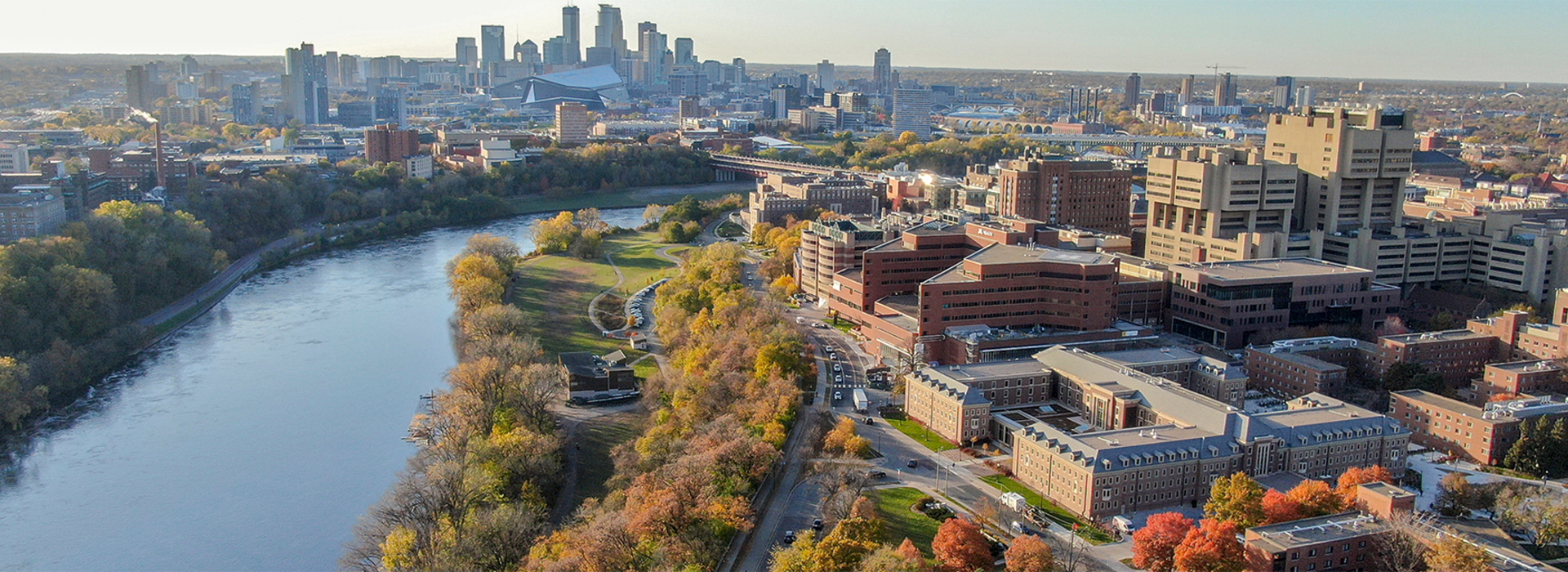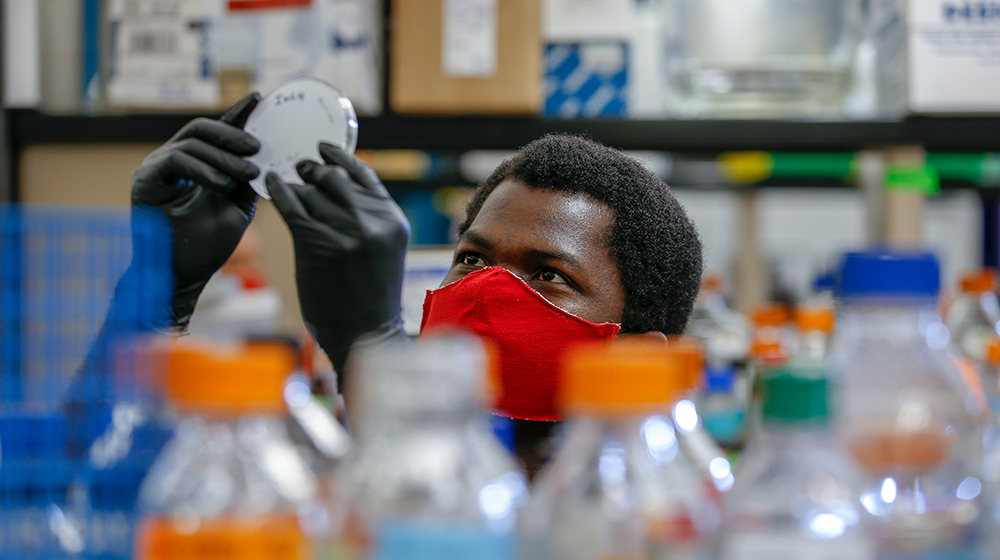
Mental Health
The healthcare and academic environments are known to be complex, demanding and often stressful. Those working in such contexts are at risk of chronic stress or burnout. The COVID-19 pandemic has posed additional challenges, demanding many adjustments to work and life activities, financial stress, and caregiving or at-home schooling responsibilities.
The medical school community cares - for each other, for our larger community and for our mission. We experience collective and personal stressors. The goals of this conversation are to help each other by sharing our stories and to remind us that despite the physical isolation, we are not alone. Ideas, small wins, challenges, silver linings, ways to manage time and energy - please help us take care of ourselves and the people that support and surround us.

Need time away from work?
Many leave options exist, depending on if you’re ill, caring for someone who is, caregiving when other care options are unavailable, or simply need time away to address personal matters.
View the frequently asked questions (FAQs) below for additional information, and please contact your human resources partner to discuss options that match your situation.
Time away from work & leaves of absence Frequently Asked Questions (FAQs)
What leave options do I have if I become ill with COVID-19?
- University Emergency Paid Leave allows for employees to use up to 80 hours (prorated for part-time employees) of paid time away from work in the following circumstances:
- Employees are unable to work or work remotely due to COVID-19 related illness
- Employees need to quarantine or isolate because of exposure to COVID-19
- Employees must care for someone who is ill with COVID-19
- Employees must care for a child whose school or childcare is closed or unavailable or help with the relocation of a college-age child due to COVID-19
- Student employees are eligible to use Emergency Paid Leave in the above circumstances, including time needed to relocate themselves due to COVID-19. Student employees can take paid leave equal to the number of hours they work on average over a two-week period.
- Additional leave time may be available under the Families First Coronavirus Response Act (FFCRA). More information available here: https://humanresources.umn.edu/covid-19/ffcra#sick
- Please contact your Human Resources team to discuss how the leave options apply to your situation.
What leave options do I use if my children are not able to attend in-person school?
- An employee is eligible to take paid leave under both the University Emergency Paid Leave and the FFCRA, including an extended family and medical leave, on days when the employee's child is not permitted to attend school in person and must instead engage in remote learning.
- This leave can be taken as long as the employee is actually caring for the child during that time and only if no other suitable person is available to do so.
- These leaves are not available to take care of a child whose school is open for in-person attendance, but the employee chose a remote learning option for the child.
- Details at https://humanresources.umn.edu/covid-19/ffcra
- Please contact your Human Resources team to discuss how the leave options apply to your situation.
I’d like to take some time away from work, but I don’t want to lose my UMN benefits.
- UMN offers unpaid leaves of absence for faculty and staff for personal reasons for up to 12 months. Partial leaves of absence may not reduce benefits eligibility. Please contact your human resources contact to discuss options.
- For shorter periods of time away from work, employees are always able to use eligible vacation time as approved.

Resources Available to You
Many resources exist to help you cope with some of these stressors. Depending on your role within our multifaceted organization, you may find valuable tools to help you and your families.
Medical School
The resources in this section are available to faculty, staff, and students within the University of Minnesota. Some of these resources are also available to the public.
MN Resilience Action Plan (MINNRAP)
The Minnesota Resilience Action Plan (MinnRAP) is a program developed to address the effects of the COVID-19 pandemic on members of our community. We are all having different reactions, and there are strategies we can use to increase our resilience.
Mental health consultants will also be available in each department (in development), as liaisons to connect with faculty and staff, talk about stress, resources and strategies. Discussions will occur on a quarterly basis.
For more information about this program, and the tools that are available to you, please contact:
Annie Walsh, University of Minnesota Physicians
awalsh10@umphysicians.umn.edu
Dawn England, University of Minnesota Physicians
dengland10@umphysicians.umn.edu
Benefits and the Wellbeing Program
Medica mental health care is covered by the UPlan Medical Program.
-Find a mental health provider by location, name, or specialty using the Live and Work Well site from Optum. Use "medica" as your access code.
-You can also call Medica Behavioral Health at 1-800-848-8327 to ask for help finding a mental health provider. This phone line is open 24 hours a day, seven days a week.
-Amwell offers virtual behavioral health care services, including therapy and psychiatry, for UPlan members.
-Eligible behavioral health services are covered as an office visit with a primary care copay.
-Your Amwell visit can be through a computer or mobile app anytime of the day or night.
Face-to-face health coaching for stress is available in the Twin Cities campuses (Crookston and Rochester employees can also access virtual health coaching through Boynton Health). Call 612-625-3222.
-RedBrick phone coaching covers topics such as anxiety, depression, and stress. Contact RedBrick Health to schedule a phone coaching session at 1-844-724-8636.
-You can find this information on our mental health resources page.
Employee Assistance Program (EAP)
Sand Creek EAP provides confidential professional consultation and referral services to address any personal or work concern that may be affecting your wellbeing. You can receive up to eight sessions per issue at no cost. Call 1-888-243-5744.
Center for Spirituality and Healing (CSH)
CSH has many unique resources to offer the community during the pandemic.
Free Stress Busters online (Tuesdays at noon)
-Learn more about the informal hour of meditation and light movement.
Other Free Webinars
-Upcoming and previous recordings
-Examples: Mindfulness During Challenging Times
Artistic Antidote
The newly-formed Center for the Art of Medicine at the University of Minnesota welcomes you to join this email list for a daily Artistic Antidote for a Pandemic. The Daily Pause is a piece of poetry, brief prose, music, or visual art that can serve as a compass to help us find direction and remind us that there is still solid ground beneath our feet and a steady horizon ahead of us.
The Department of Psychiatry and Behavioral Sciences’ Integrative Psychiatry and Wellness Program
Youtube Channel
The Department of Psychiatry and Behavioral Sciences offers Integrative wellness services to help patients and the community cultivate mental health and emotional wellbeing. Our approach blends conventional psychiatry and behavioral health with the best evidence-informed strategies from integrative and functional medicine
Mind-Body Training Sessions
Mind-Body Training Sessions support the development or fine-tuning of personal mind-body skills by accommodating your particular physical, mental, and emotional conditions and are tailored around your intention. (Individual or arranged for a team, ongoing sessions.)
Regular presentations on mindfulness or self-compassion to healthcare teams
M Physicians Benefits
University of Minnesota Physicians (M Physicians) providers and staff have access to health and wellness resources through M Physicians and can view information in RESOURCE under the Human Resources section.
Overview of Health and Well-Being information in RESOURCE:
-“Guide to your Health and Well Being” for staff and faculty physicians
-VITAL WorkLife and tipsheets
-Work-Life Benefits (LegalEase Legal Insurance, life events, discounts, time off, child and elder care)
-Financial tools and 401(k)
-Workplace Well-Being
-Health and Safety (Incident form, Flu Vaccination Program)
-UCare Benefits (for employees 65+)
You can log into RESOURCE with your M Physicians or UMN email address and password. All U of M and M Physicians faculty, staff and trainees have access. If you have problems logging into RESOURCE contact med-web@umn.edu and someone will help you login.
If you have questions about M Physicians benefits, please contact benefits@umphysicians.umn.edu.
-Unlimited usage during COVID
-Subsidized by UMP
-Reimbursement for relatives/others to provide care
Mental Health/Well Being – AiRCare
833-379-9596
Mphysicians@aircarehealth.com
Top Five Concerns:
-Mental Health
-Relationship Issues
-Parenting Concerns
-Burnout
-Work-Life Balance
Vital WorkLife
877-731-3949
service@vitalworklifeconcierge.com
Concierge – Reducing stress & saving time - experts help with a wide variety of daily tasks:
-Dining recommendations
-Household chores
-Day-to-day support for children or parents
Fairview Benefits
If you practice in the M Health Fairview system, you have access to Fairview/HealthEast benefits listed in the Fairview intranet.
National Resources
- National Academy of Medicine Action Collaborative on Clinician Well-Being and Resilience
- Center for the Study of Traumatic Stress
- National Suicide Prevention Lifeline
- Call 1-800-273-TALK (8255)
- In the Twin Cities metro, dial “CRISIS” or text “MN” to 741741
- National Domestic Violence Hotline
- Call 1−800−799−7233 or TTY 1−800−787−3224
Lidia Zylowska, MD, associate professor, Department of Psychiatry and Behavioral Sciences discusses stress, burnout and mental health.
Meredith Gunlicks-Stoessel, PhD, LP shares how to set healthy boundaries.
In an excerpt from a presentation to graduate students, Dr. Kaz Nelson talks about stress, referencing Maslow's hierarchy of needs model to talk about self-care strategies.
If you (or someone you know) is having a mental health crisis and/or is in immediate danger, please call 911. If you are not sure whether the situation represents immediate danger, err on the side of caution and place the call.